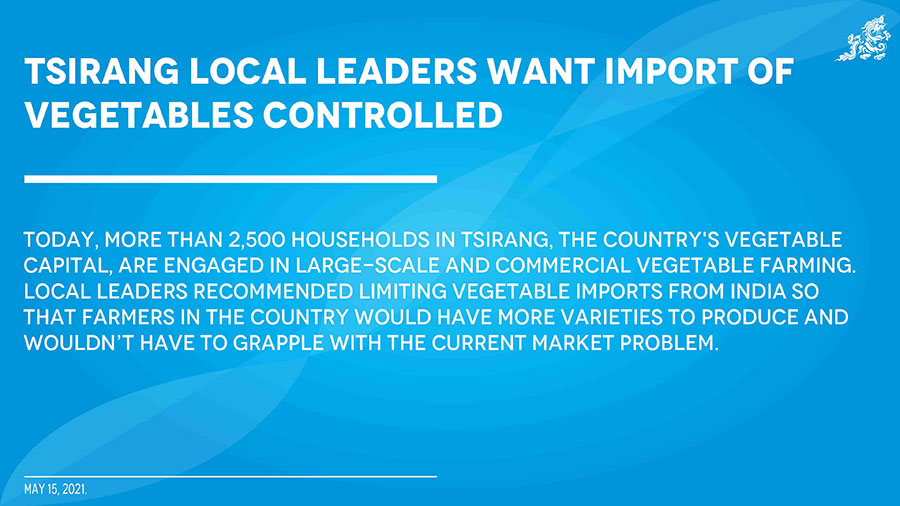Chimi Dema | Tsirang
Otherwise known as the vegetable capital of the country, Tsirang imports at least 5 metric tonnes (MT) of vegetables in a week.
The major imported vegetable, going by the records maintained by Bhutan Agriculture and Food Regulatory Authority (BAFRA) office is potato followed by onion. The dzongkhag imports an average of 2,000 kilograms of potato and 1,200kgs of onion in a week.
According to the Renewable Natural Resources Census Reports, Tsirang produces about 3,000MT of vegetables including chilli, bean, and cauliflower.
The local leaders, during the recent Dzongkhag Tshogdu (DT) proposed that the import of vegetables from India be limited.
Rangthaling Gup Bal Bdr. Tamang said that many people ventured into commercial vegetable farming over recent years.
In Rangthaling alone, he said that residents had procured over 50 power tillers on their own to focus on vegetable production.
“While there is huge potential for mass production, what worries us the most is that whether our farmers will have access to the market in presence of imported commodities,” he said. “There were times in the past where our farmers struggled to sell cabbages because imported ones flooded the market.”
Gup Bal Bdr. Tamang said that the import of vegetables should be controlled to encourage farmers at home.
Calling for a timely intervention, the DT Chairperson, Shiva Lal Kararia, said that it would demotivate growers if such limit isn’t implemented.
Supporting the motion, dzongkhag agriculture officer, Dorji Gyeltshen, said that limiting the import of vegetables would only promote self-sufficiency in the dzongkhag.
He said that farmers were grappling with market problem. “While we have been focusing on mass production of chilli, cabbage and cauliflower, we couldn’t grow carrot and bitter gourd because these are imported.”
If the import of these vegetables is limited, he said it would enable the opportunity for farmers at home to grow more.
The DAO also suggested that the import limit be implemented considering situation and vegetable production season in the dzongkhag. “For instance, the production of onion here isn’t favourable between May and June.”
The nursery for winter vegetable farming usually starts in September and production begins from early January. The season for summer vegetable farming is between February and October.
The DT decided to further deliberate the matter among local leaders, dzongkhag agriculture officials and agriculture and forestry ministry.
It was also discussed that a proper place for local vegetables should be designated at CFM in Thimphu.
Tsirang has 6,000 households involved in vegetable production with more than 2,500 growing on large and commercial scale today.
The major vegetable-producing gewogs are Mendrelgang, Gosarling, Patshaling, and Kilkhorthang.


